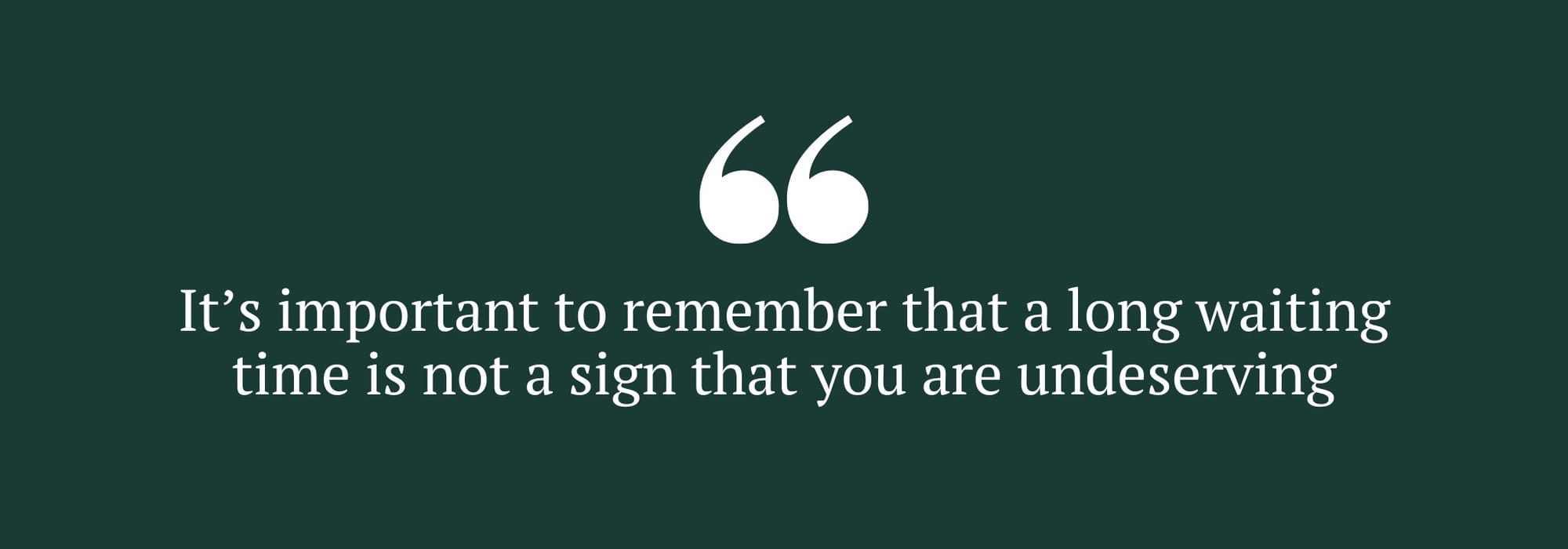Being on a long waiting list can be challenging and distressing. Here, we share advice on taking care of yourself while you wait for support
Life with mental health problems can be hugely challenging, and waiting weeks, months, or even years for professional support can bring additional demands. According to a report by the National Audit Office, the latest estimate put the mental health waiting list at 1.2 million people, and it seems that everyone knows someone who is on a waiting list for mental health support – whether that’s a friend, family member, colleague, or yourself.
It may be waiting for talking therapies, diagnostic assessments that GPs are not qualified to carry out, or medication reviews by psychiatrists, but waiting for treatment can make an already stressful situation even more upsetting. “Untreated mental problems can worsen over time without timely support, and can become more complex, requiring more treatment over the longer term,” person-centred counsellor Lianne Terry explains. Without access to professional mental health support, individuals may feel confused and not know how to cope, Lianne points out. “Several areas of a person’s life can be affected too, such as work, family, or relationships.”
With that in mind, here are five tips for making the wait a little more comfortable.
1. Remember it’s not your fault
For lots of reasons, people with mental health difficulties may experience low self-esteem or eelings of worthlessness. When we are struggling emotionally, it’s only natural to internalise a long waiting time and have thoughts such as ‘I don’t deserve help,’ or ‘Nobody wants to help me.’ It’s important to remember that a long waiting time is not a sign that you are undeserving, but a symptom of an over-stretched health system.
“Long waiting times can contribute to feelings of being undervalued or overlooked, and can also diminish hope and trust,” Lianne says. Imagine what the professional you are waiting to see would say to you – most likely they would say they value you, feel compassion for your wait, and wish they could see you promptly.
2. Reduce self-judgements and increase self-compassion
Often, people with mental health problems feel guilty or ashamed of their struggles, and experience self-judgements such as ‘I’m a burden,’ or ‘Others have it so much worse.’ Try to notice these for what they are: judgements that are not accurate reflections of you. Try to use affirmations such as, ‘Everyone deserves support,’ or ‘I am worthy of help.’
Lianne recommends gently turning your attention to meaningful activities. Pursue activities that you enjoy and that provide a sense of accomplishment. Whether it’s gardening, reading, or crafting, engaging in hobbies can be a great way to distract and uplift yourself.

3. You are allowed to advocate for yourself
Keep a dated log of appointments, noting down the clinician’s name and any outcomes. If a referral is made, ask what the estimated waiting time is to be seen, and clarify whether that’s for an initial assessment or the start of treatment.
Once your waiting time is nearly up, it may be helpful to call or email to check that you are on track to be seen. If your wait is set to be more than a year, make contact every few months to receive an update. Having an idea of the waiting time, no matter how long, is less anxiety-provoking than not knowing at all.
It’s worth asking how you will be contacted for an appointment once one does become available. Check your email spam folder reguarly just in case, and ensure the service has up-to-date postal and email addresses for you. Set your phone to accept withheld numbers (as health services often use these for confidentiality), and be sure to check your voicemail regularly.
4. Seek alternative, complementary support while you wait
“Make use of mental health helplines and online resources, organisations like Samaritans, Mind, and Anxiety UK which offer support and information, along with exploring books or apps that offer self-help techniques and coping strategies, such as CBT workbooks, and mindfulness apps like Headspace and Calm,” Lianne says. While these aren’t a replacement for support from a mental health professional, they can be helpful for day-to-day coping mechanisms.
Even though lots of us are on waiting lists for mental health care, the countdown to be seen can feel lonely. Connection with others is especially important at this time. “Share your feelings and concerns with trusted friends or family members,” says Lianne. “Join a support group, either online or in person, where you can connect with others facing similar challenges.”

5. Be careful with your research
While waiting you are likely to have numerous questions such as ‘Why do I feel this way?’ and ‘Will things ever improve?’ The anticipation and tension can be especially high if you’re awaiting a diagnostic assessment, for example, to understand whether you are autistic, or have ADHD – or a mental health condition that requires a psychiatrist to diagnose, such as bipolar disorder. It’s completely understandable to feel impatient, frustrated, anxious – or even scared, angry, and upset. Feeling all of these emotions, and more, is completely valid.
No matter how desperate you feel for answers, take care when researching. Think critically about the information you consume, use reputable sources, and remember that everyone is unique. No amount of reading or Googling will be as effective as a professional taking the time to understand your life.
If you need urgent help for your mental health, call 111 and select the mental health option (option 2) or get help from 111 online.


Comments